Analysis: Referendum results night (in bite-sized chunks)
- Published
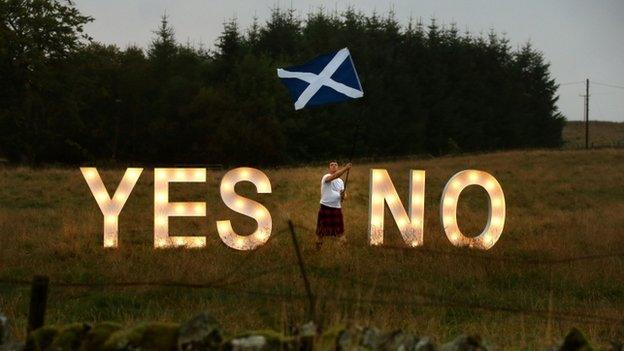
Keeping up with what is happening as the results of the Scottish referendum come in. Here are some bite-sized chunks of analysis.....
Posted 07:16
David Cameron says there is clear support for maintaining the union. It is time now for the UK to come together - with a "balanced settlement" which is fair to Scotland and elsewhere in the UK.
He says the debate on independence has been "settled for a generation": the settled will of the Scottish people. That latter a conscious echo of words delivered by John Smith about devolution.
Now, he says, there is a chance to change the way the British people are governed. Once more, emphasis on all the constituent parts of the UK.
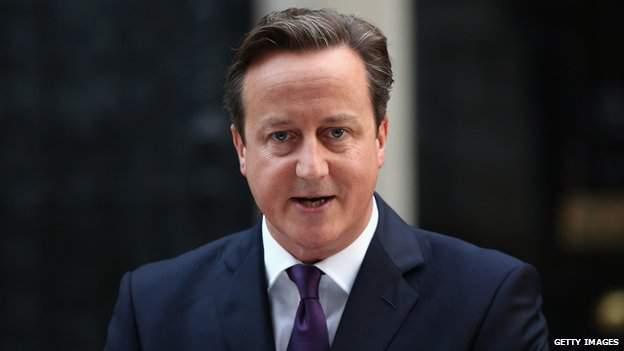
Insists the promises for Scotland will be delivered "in full". Lord Smith of Kelvin to oversee that process.
England, Wales and NI must have bigger say too. A new and fair settlement across the UK.
More powers for Wales. Make devolved institutions function effectively in NI. But now England must be heard.
In short, he wants a decisive answer on West Lothian - with English votes on English issues. William Hague to work on that. To the same timetable as the Scottish action.
Challenges: can it be done to the timetable; will not some, perhaps many, at Westminster want to move on to other issues; will not the UK parties be focused on fighting the General Election rather than agreeing on the constitution.

Posted 06:50
Alistair Darling says momentous day for Scotland - and endorsement for the Union. But also, he says, there is a need to listen to the "cry for change".

Posted 06:25
Alex Salmond thanks Scotland for 1.6m votes for independence. Acknowledging that there is a majority for No, he urges all in Scotland to accept that outcome.
The conduct of the plebiscite - and the turnout - are, he says, part of a triumph for the democratic process and for participation in politics.
Turning to the consequences, he pledges to work constructively in the interests of Scotland and of the rest of the United Kingdom. Explicitly, he says that the promise of more powers must be honoured "in rapid course".
A clear indication, once more, of the direction which the SNP will follow: demanding and driving change.
Equally, though, Mr Salmond is speaking at a rostrum with a logo stating "One Scotland". His approach, therefore, offers a consensual tone following a closely fought and, by simple definition, potentially divisive referendum.
At the same time, however, he identifies a "scare and a fear" at the heart of the Westminster establishment.
But his conclusion is that there will be further progress. Not independence. But change.

Posted 06:11
And so Scotland says no to independence. But the vote for Yes is sufficiently large that there will be substantial pressure for further reform.

Posted 05:38
If there is a "No" vote - as seems likely - what might be the impact upon the SNP? Clearly, there would be a period of introspection. But would the party fragment? I think not.
Firstly, even if the vote is lost, this would be a good performance for the wider independence cause.
Secondly, the SNP is not the same party as the one which faced a rethink in the aftermath of the very different referendum in 1979.
The Nationalists are now a party of government, a decidedly outward-looking and professional outfit.
Thirdly, and perhaps most significantly, there would be a clear role for the SNP in acting as a form of chief whip, driving the demands for further change: both constitutional and in the lives of people.

Posted 05:13
Nicola Sturgeon says there is no endorsement of the status quo.
She says there is plainly a huge appetite for change.
An indication of the ultimate response of the SNP: that they have a significant role in pressing the demands for change.
"Move forward together", says the deputy first minister. And she confirms her party will work with anyone to deliver substantial new powers for the Scottish Parliament.

Posted 05:09
And that message re expectations is, of course, emphasised by the vote in Glasgow. A significant win for "Yes".

Posted 05:07
Lord Reid, the former Labour cabinet minister, says the vote for "Yes" is partly a protest against poverty.
He argues that must be heeded. It adds to my argument that there will be a popular expectation of change.
Not, it would appear, independence. But change.
Supporters of the Union said that a "No" vote did not mean no change.
People will expect delivery of that and, I would submit, will expect delivery in particular from the party whose leading figures most prominently drove that offer. Which is Labour.

Posted 04:57
Lanarkshire divides. The north votes "Yes". The south votes "No".
Again, that vote in North Lanarkshire adds to the pressure upon Labour in particular to deliver upon the promises lodged towards the close of the campaign.
Not just constitutional change but that people's lives would be enhanced.

Posted 04:41
Tommy Sheridan of Solidarity says he is "broken hearted" at the trend towards a "No" vote.
He says the British establishment has mobilised against the prospect of "Yes".
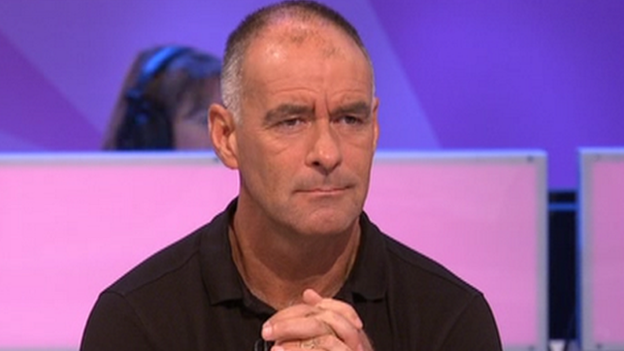
Tommy Sheridan said he was "broken-hearted" at the trend towards a "No" vote

Posted 04:21
A couple of victories to cheer the heart of "Yes" supporters. Dundee and West Dunbartonshire.
This means that right now the pendulum swings back to a close set of votes. Right now. Still need a few bigger councils.
Final outcome could rest with larger west of Scotland areas - Glasgow, Lanarkshire.

Posted 03:43
Remarkable outcome in Inverclyde. Very, very narrow win for "No".
"Yes" were hoping here for victory, particularly on the back of efforts by the Scottish government to rescue Ferguson Shipbuilders in the area.

Posted 03:16
And so a hat trick has become a quartet with victory for "No" in Eilean Siar.
A poor result for "Yes", given the relative strength of the SNP in that area.

Posted 03:02
Labour MSP Kezia Dugdale says it was "clear from the doorsteps" that people wanted more information on the offer of more powers.
In short, that means the late restatement of the offer was driven by concern that ground was being lost.

Posted 02:47
Shetland completes an early hat trick for the "No" side.
However, by definition, it is the very smallest councils which are declaring first.
Of the three, Clacks is the most significant. Of the three, an area where "Yes" might have hoped to do rather better.

Posted 01:35
Gordon Wilson again. He says it is beginning to look as if "No" might win the day. Not, he stresses, that he is conceding.
Based upon the opening result from Clackmannanshire which, he said, was a disappointing outcome. The result there, of course, 54% to "No" 46% for "Yes".
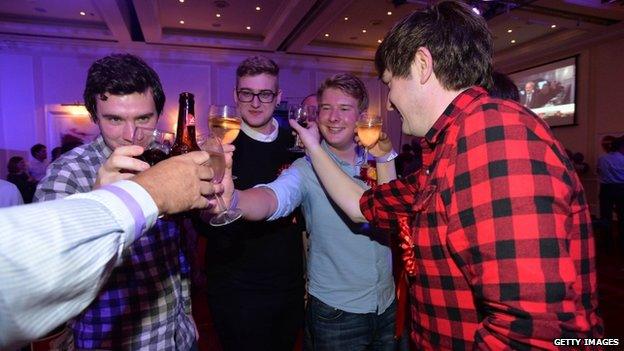
Celebrations in Clackmannanshire after the "No" result is declared

Posted 01:22
Gordon Wilson, the former leader of the SNP, says that in the event of a "No" vote, Scotland's influence will vanish into the sand.
Mr Wilson voiced substantial scepticism as to whether the response of the UK establishment in such an eventuality would be radical.
If it is indeed a "No" vote, the focus - or one focus - would be upon that offer of more powers. I stress, if...

Posted 00:51
Intriguing comments from polling organisation leaders on the potential outcome. They suggest that "Yes" made significant ground, only for there to be a move back in a "No" direction right at the very close.
All note the difficulty in assessing a referendum by contrast with elections - where there is a history of comparable voting behaviour. All agree the need to reassess polling methods.
As I say, intriguing - but of decidedly minor moment by comparison with the decision being taken by Scotland tonight.
Two years of campaigning. Two seconds to mark a cross on a small piece of paper.

Posted 00:28
Henry McLeish, the former first minister, says he was a "reluctant No". He believes that the "No" campaign struggled but was revived by Gordon Brown. In his word, he "rescued" the campaign.
If it is a "No" vote, will Gordon Brown seek to maintain a prominent role in securing reforms to Holyrood powers?
Or were his ideas adopted in the latter days of the campaign in order to sustain a united front on the "No" side?

Posted 00:01
What is that shirt that Ken MacDonald is wearing? Whatever it is, it is too loud - we can't hear him.
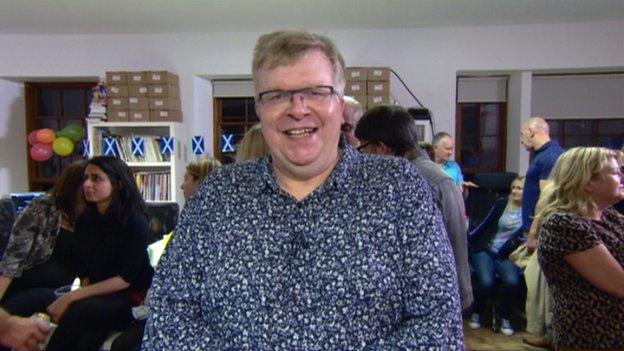

Posted 23:56
The evidence from throughout Scotland is of a large, indeed a phenomenal, turnout. A series of questions arise from that.
1. Will this benefit one side or the other? That depends upon differential turnout. Is one side or the other feeling more motivated, more inclined to participate?
It had been thought that the more motivated side would be "Yes". It had been thought this could be worth 1% or 2% in the final tally.
However, at these huge levels of interest, that may be open to challenge. It seems that the entirety of Scotland is engaged. We shall see.
2. This level of interest poses a challenge to politics as it has become known. Can these figures be replicated at UK or Scottish general elections? Should voting be extended to 16 and 17-year-olds for all democratic exercises?
3. How to unite the nation in the aftermath, given the extent of interest? I was delighted to hear Mary Pitcaithly, the chief counting officer, say that the process of the vote has been conducted with civility and dignity. It is to be hoped - and I believe will be the case - that this is carried through: that people respect the outcome and each other.
4. The aftermath for the constitution. If it is a "Yes" vote, how will negotiations proceed? What will be the response of the UK government, the markets, the global community?
If it is a "No" vote, will the UK parties deliver on their sundry promises to enhance Holyrood's power?
Will the huge volume of voters today be content with either process, as it develops?
